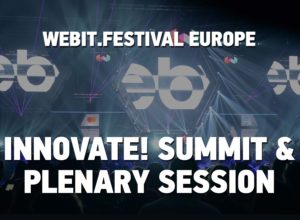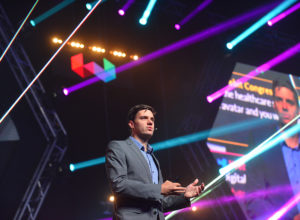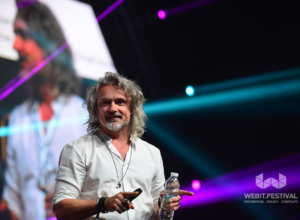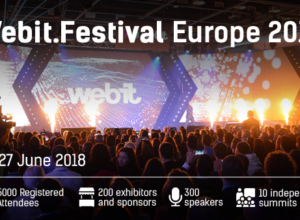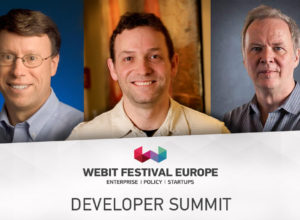Tag: Industry
For Innovate, press 5
If you look just 10 years back...
you can easily see the rapid evolution of digital industry. Everything is smart - phones, watches, we even have home AI assistants so that our homes can be smart. At this point we cannot and we don’t want to imagine the world without the technological advantages. More or less, this is normal: for the century we live in, for our jobs, for our life nowadays. So 10 years in our century is a period in which A LOT can change. Just a few months ago Webit celebrated its 10-year anniversary. The festival grew rapidly to become one of Europe’s (and even world’s) largest forums for innovation, technology, entrepreneurship, policy and startups. /You can watch the trailer here: https://youtu.be/695bBvsv6vQ/ Webit.Festival gathers tech, digital and policy elite to re-invent and pave the digital future of Europe.This year is no exception.
We would like to introduce you to some of our confirmed 2019 speakers. So in the next few weeks we will share some interesting information about the amazing line up that we are preparing for this year’s Festival.Today we’d like you to meet 5 Innovation Gurus:
On the Innovate Stage you will see: Dr. Goertzel is one of the world’s foremost experts in Artificial General Intelligence. (It is a subfield of AI oriented toward creating thinking machines with general cognitive capability at the human level and beyond.) Ben also has decades of expertise applying AI to practical problems in areas ranging from natural language processing and data mining to robotics, video gaming, national security and bioinformatics. He has published 20 scientific books and 140+ scientific research papers. He is also the main architect and designer of the OpenCog system and associated design for human-level general intelligence.
Dr. Goertzel is one of the world’s foremost experts in Artificial General Intelligence. (It is a subfield of AI oriented toward creating thinking machines with general cognitive capability at the human level and beyond.) Ben also has decades of expertise applying AI to practical problems in areas ranging from natural language processing and data mining to robotics, video gaming, national security and bioinformatics. He has published 20 scientific books and 140+ scientific research papers. He is also the main architect and designer of the OpenCog system and associated design for human-level general intelligence.
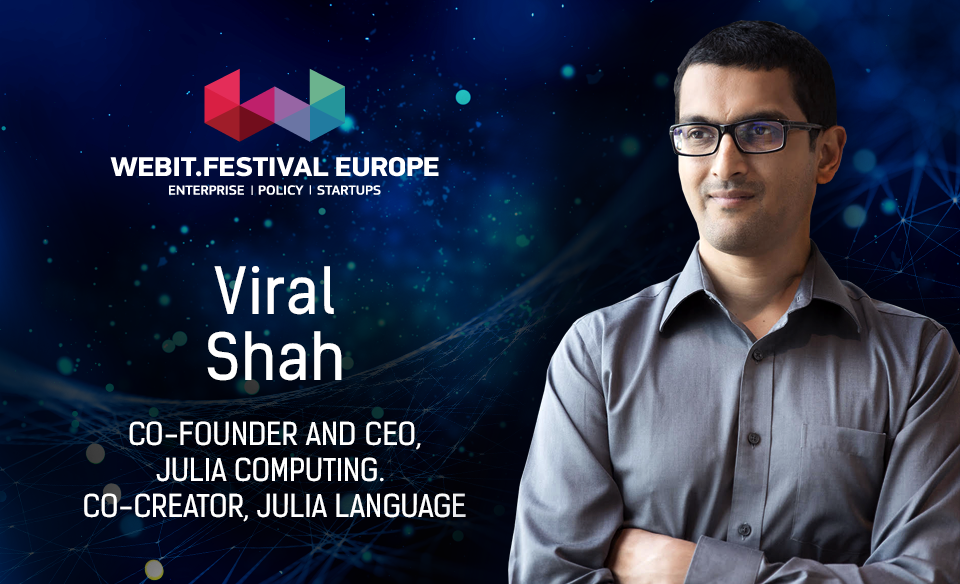 Dr. Viral Shah is CEO of Julia Computing, co-creator of the Julia programming language and winner of the 2019 James H. Wilkinson Prize for Numerical Software.
He implemented a risk management system for derivatives trading on the National Stock Exchange in India.
Viral co-authored Rebooting India with Nandan Nilekan. He is also co-founder of Infosys and founding chairman of the Unique Identification Authority of India, which has delivered unique bio-metric identification to 1.2 billion Indians in the past decade. Rebooting India describes Nandan and Viral's experience implementing a large-scale technology project in government. Viral and his co-creators started Julia as a hobby but it is now their full time occupation at Julia Computing.
Julia is the fastest dynamic programming language for numeric and scientific computing, including artificial intelligence and machine learning. Julia is free and open source and is used by more than 10,000 enterprises and 1,500 universities with over 2 million downloads, 1,900+ packages and 800+ open source contributors.
Dr. Viral Shah is CEO of Julia Computing, co-creator of the Julia programming language and winner of the 2019 James H. Wilkinson Prize for Numerical Software.
He implemented a risk management system for derivatives trading on the National Stock Exchange in India.
Viral co-authored Rebooting India with Nandan Nilekan. He is also co-founder of Infosys and founding chairman of the Unique Identification Authority of India, which has delivered unique bio-metric identification to 1.2 billion Indians in the past decade. Rebooting India describes Nandan and Viral's experience implementing a large-scale technology project in government. Viral and his co-creators started Julia as a hobby but it is now their full time occupation at Julia Computing.
Julia is the fastest dynamic programming language for numeric and scientific computing, including artificial intelligence and machine learning. Julia is free and open source and is used by more than 10,000 enterprises and 1,500 universities with over 2 million downloads, 1,900+ packages and 800+ open source contributors.
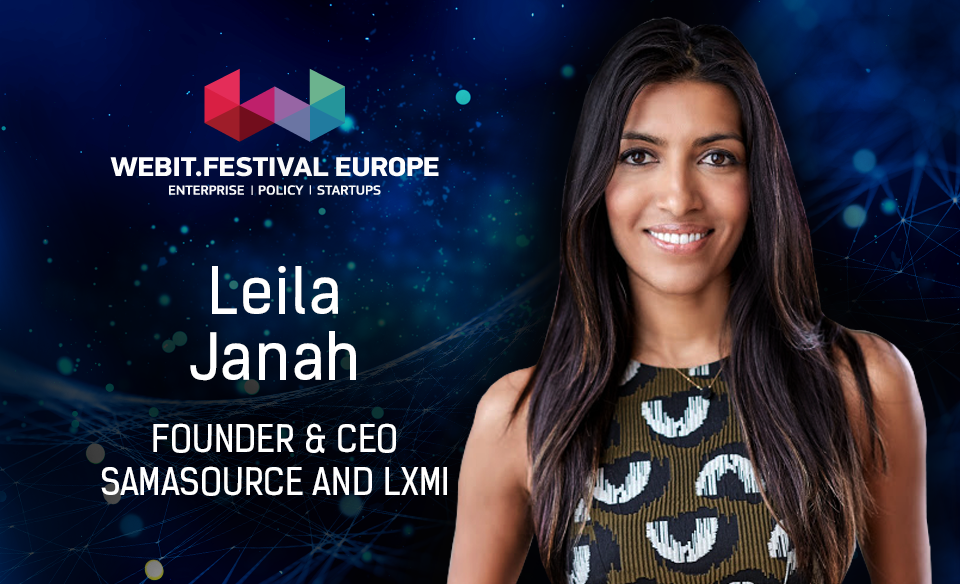 Leila Janah is the Founder and CEO of Samasource and LXMI, two companies that go beyond charity to #givework to low-income people around the world using cutting-edge social enterprise models in technology and luxury skincare, respectively. She is the author of the book Give Work (Penguin/RandomHouse).
Leila is a Young Global Leader of the World Economic Forum, a former Director of CARE USA, a TechFellow, recipient of the inaugural Club de Madrid Young Leadership Award, and also the youngest person to win a Heinz Award in 2014. She is one of Fortune’s Most Promising Entrepreneurs. And she was the subject of cover stories in Entrepreneur, Fast Company, and Conscious Company Magazines.
Leila Janah is the Founder and CEO of Samasource and LXMI, two companies that go beyond charity to #givework to low-income people around the world using cutting-edge social enterprise models in technology and luxury skincare, respectively. She is the author of the book Give Work (Penguin/RandomHouse).
Leila is a Young Global Leader of the World Economic Forum, a former Director of CARE USA, a TechFellow, recipient of the inaugural Club de Madrid Young Leadership Award, and also the youngest person to win a Heinz Award in 2014. She is one of Fortune’s Most Promising Entrepreneurs. And she was the subject of cover stories in Entrepreneur, Fast Company, and Conscious Company Magazines.
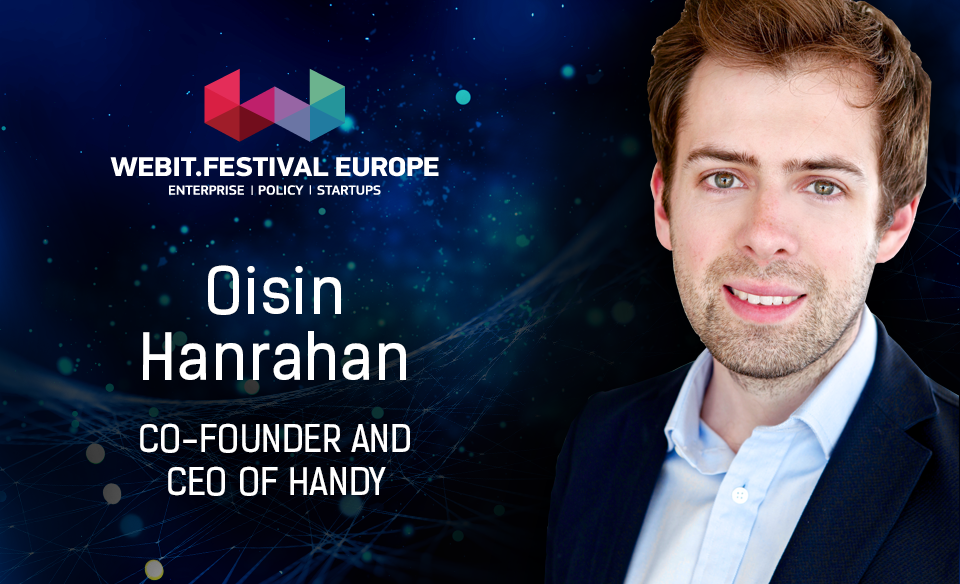 Oisin Hanrahan is a serial entrepreneur with deep knowledge of two-sided marketplaces and a keen interest in technology and politics. Oisin is currently the co-founder and CEO of Handy which he founded in 2012. Handy is changing the way that people book and provide home services. From home cleaning to TV mounting, smart home setup to furniture assembly, people turn to Handy for a seamless, fast and top-quality experience that provides them with access to the home services they need.
Oisin also advises and invests in startups, particularly in New York City. Major media extensively featured Oisin’s work, including CNBC, The Wall Street Journal, and The New York Times.
Oisin Hanrahan is a serial entrepreneur with deep knowledge of two-sided marketplaces and a keen interest in technology and politics. Oisin is currently the co-founder and CEO of Handy which he founded in 2012. Handy is changing the way that people book and provide home services. From home cleaning to TV mounting, smart home setup to furniture assembly, people turn to Handy for a seamless, fast and top-quality experience that provides them with access to the home services they need.
Oisin also advises and invests in startups, particularly in New York City. Major media extensively featured Oisin’s work, including CNBC, The Wall Street Journal, and The New York Times.
And last but not least, a dear Webit friend -
 Martin Wezowski, has been loving and living design and tech his whole career.
As Chief Designer for SAP's Innovation Center Network & Chief Innovation Office he crafts future outlooks, strategies and products, defines and runs innovation frameworks to find out what’s next for SAP and the future of work. He frequently shares his passion for the future of technology and design (TEDx, SXSW, CES, Ada Lovelace, CeBIT, MOBx, Grace Hopper, SIME, MLOVE etc.).
He builds on his international adventures stretching from Poland, Sweden, China to Germany and across companies like SAP, Sony and Huawei, working with consumer electronics, media services and business software.
Martin Wezowski, has been loving and living design and tech his whole career.
As Chief Designer for SAP's Innovation Center Network & Chief Innovation Office he crafts future outlooks, strategies and products, defines and runs innovation frameworks to find out what’s next for SAP and the future of work. He frequently shares his passion for the future of technology and design (TEDx, SXSW, CES, Ada Lovelace, CeBIT, MOBx, Grace Hopper, SIME, MLOVE etc.).
He builds on his international adventures stretching from Poland, Sweden, China to Germany and across companies like SAP, Sony and Huawei, working with consumer electronics, media services and business software.
Тake advantage of the special Early bird prices and book your ticket for Webit.Festival Europe 2019 for as low as 100 EUR!
Will the blockchain industry change digital advertising?
The crypto market exploded over the last three years. A lot of industries started looking at blockchain as a technology, as to whether it can solve some of their biggest challenges.
Let's look at blockchain:
Blockchain as a technology is still at its infancy. We're still at the hype cycle and blockchain is sitting right next to autonomous vehicles which I don't see happening in the next two or three years and Event-triggered marketing. So as a technology, blockchain might grow into something big like the internet or even bigger, but it might also fade away into some narrow use cases.How can Blockchain improve the Digital Media and advertising landscape?
There are some use cases which are rather obvious: * Fraud detection and prevention * User Identity * Buying and selling inventory, etcCentralization vs. Decentralization
Trust a third party or to use a decentralized approach?Decentralization PROs
* Durability, reliability and longevity - Due to the decentralized networks, blockchain does not have a central point of failure and is better able to withstand malicious attacks. * Process integrity - Users can trust that transactions will be executed exactly as the protocol commands removing the need for a trusted third party. * High quality data - Blockchain data is complete, consistent, timely, accurate and widely available. * Transparency and immutability - Changes to public blockchain are publicly viewable by all parties creating transparency. All transactions are immutable, which means they cannot be altered or deleted.Decentralization CONs
* Trusted 3rd parties - it's not Central vs Decentralized. The advertising ecosystem is based on trusted third parties. These 3rd parties are innovation drivers. * It's too slow - Digital advertising is real-time. RTB standard requires service response in 100ms.There are several examples which already use blockchain in addressing some of digital advertising's biggest challenges.
adChain tries to create a token curated registry of publishers in order to verify and simplify the buying. And papyrus is a decentralized programmatic value management platform aimed to radically improve programmatic advertising stack. All of these solutions are in the making, they are not really ready but they are evolving pretty fast. Several years ago we were talking about mobile apps, then AI, now blockchain. The hype cycles of few years ago were longer and we used to have more time to adapt to them. But now they are becoming shorter and they’re starting to overlap. It wasn’t long long ago that we were talking about programmatic buying. Now it is programmatic buying on a decentralized exchange powered by blockchain.Missed the 2018 edition of Webit.Festival Europe? Don’t miss the 2019! Get your super early bird 2in1 tickets – 2 for the price of 1 here!
Martin Wezowski talks about “WTF – What’s the future” @Webit.Festival 2018
"The future is very important, because we will kind of spend the rest of our lives there. So we better make it really good. :)"
Martin Wezowski is the Chief Designer & Futurist at SAP. He joined Webit to put some perspective on “what is work and what is human in a superhuman future”.Martin, being a fan of the Beatles, started with playing a tune that resembles the style of the iconic band. But later he revealed that the song was created by AI that mimics the Beatles.
"It listens to everything that The Beatles have ever done and makes new songs. It does it so successfully that it has over 2M views on Youtube. That should really raise deep and profound questions."
The main question is WTF - What’s the future?
One example of that is the healthcare."It takes 7-10 years to make a doctor, which gives us a severe shortage of doctors."
With the soon-future-AI, medical help will be in infinite amount everywhere, all the time for everyone. That should also change our minds about what is human work. Nowadays AI can diagnose heart diseases or lung diseases more accurately than humans. Funny enough, humans and AI combined are almost 100% correct. In the 90s we decoded the human genome. It took billions of dollars. Now there is a DNA sequencer for 1000$. What does this mean for research? What does it mean for animal testing?The NOW has never been so temporary as it is today.
Maybe we should start imagining the futures that we want and start creating them, rather than react to what we where we are today because thus we are too late. That might be a little scary because we see jobs disappearing. A hundred years ago almost everybody worked at farming, fishing, forestry. Now it's only about 2%. What did they do? What would they think if you'd tell them: "Most of you will not be in agriculture." What would hey imagine that they will do, accounting? Web development? We are in the same situation today. And it doesn't matter because we will imagine new jobs as they emerge. We can't plan for it. And the real question is this:What to teach kids to become relevant in 30 years from now?
How can we adapt to the change? What new values do we need? The stability of planning is a little bit of fake. The opposite to stability is not instability, it's emergence. It's risk, it's rock'n'roll. To transform, to challenge and take risks. Innovation is sort of rock'n'roll in business and we need more of that.One thing we rely on is the thinking of the 3 horizons.
- Continuous innovation - Ready to consume: Traditional KPIs (key performance indicators) of predictable outcomes and repeatable results and scalable efficiency.
- Adjacent innovation - Ready to Co-innovate: Forecasting your intelligence and resources to the near future, the next, the adjacent innovation where you co-innovate with your partners and/or customers.
- Transformative Innovation - Ready to Inspire: Thinking away from what you can do today and the tools you have. Your vision and thought leadership leads to ideas that you must articulate very clearly so you can have a decent discussion on executive and board level about these ideas.
Help the world run better and improve people's lives.
These two things go to the two sides of the spectrum with 4 dimensions:- The self running company
- Self organizing Business Ecosystems
- Augmented humans
- Purpose Led New Market & Business Models
“Everything from the beginning is an open end and it's up yo us to actually sit down and actually use this methods and look across all the 3 horizons, articulate futures that are desirable where we can play a significant positive role. That's our purpose. And if we do that I actually think we can design futures that we all want to live in. And we should remember to have some fun as well. :)”
Missed the 2018 edition of Webit.Festival Europe? Don’t miss the 2019! Get your super early bird 2in1 tickets – 2 for the price of 1 here!
Chairman of Huawei joins Webit.Festival 2018!
More global leaders join Webit.Festival Europe 2018!
With over 75% senior attendance among the 6000 people audience from 110 countries - the speakers can only be global leaders and shapers! Join Webit.Festival Europe to meet with them, including Mr. Liang Hua, the newly elected Chairman of Huawei - the world-leading telecommunications provider, just over $90 billion in global annual sales in 2017, Huawei is also the world’s third largest smartphone seller.STILL NOT TOO LATE!
Join the Festival and explore unparalleled business networking
A warm welcome to Thibaut Gregoire, General Counsel, Europe, MasterCard, who joins along with his colleagues - both Vice-Presidents - Mikael Svensson and Louise Holden after the President of Mastercard Europe Javier Perez already joined Webit. Presenting you some of the newly announced speakers of the upcoming Europe's tech, digital economy and policy event for 2018 - Webit.Festival!
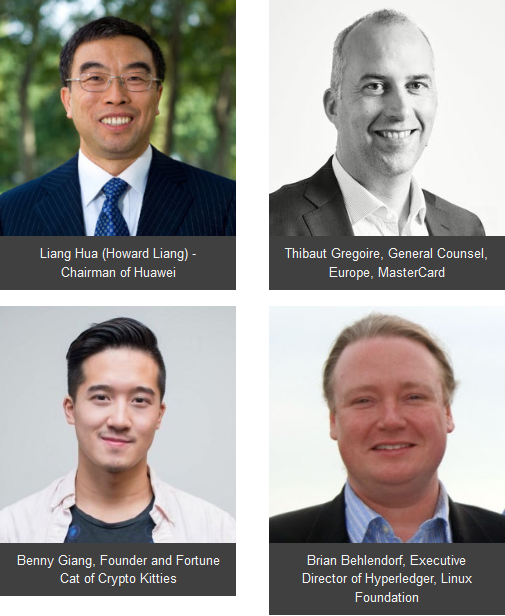 The Blockchain world joins Webit to challenge the future of the decentralized economy! Webit.Festival is the place to involve policy makers, all major tech companies and the blockchain ecosystem to innovate through collaboration!
The Blockchain world joins Webit to challenge the future of the decentralized economy! Webit.Festival is the place to involve policy makers, all major tech companies and the blockchain ecosystem to innovate through collaboration!
 With over 200 exhibitors and sponsors the 10th Webit.Festival is the largest ever European edition, double in size compared to last year.
A warm welcome to Huawei, Red Bull, Google, Amatas, Cogni, Jelurida among the newly joined sponsors and exhibitors of Webit.Fetsival 2018.
With over 200 exhibitors and sponsors the 10th Webit.Festival is the largest ever European edition, double in size compared to last year.
A warm welcome to Huawei, Red Bull, Google, Amatas, Cogni, Jelurida among the newly joined sponsors and exhibitors of Webit.Fetsival 2018.
Interested in exhibiting / sponsoring? Contact us asap!
See you on 26-27 June in Sofia! The Webit Team
Only today! 50% off from all tickets for Webit.Festival Europe 2018!
Register here and get your ticket
to join Prime Ministers, EU Commissioners and EU top policy makers, global innovators and enterprise executives, Ministers, Mayors, investors, media and Europe's top 200 startups and scaleups - all at Webit.Festival Europe with a special discount of 50% on all tickets with code: GDPR 6000 global experts (67% senior attendance) join Webit from 110 countries.Check who is speaking
Over 200 exhibitors and sponsors join Webit this year. A warm welcome to the group of new partners who join Webit including Microsoft, SAP, Samsung, Fox, Novartis, VISA, UBB, part of KBC Group, Superhosting . BG, VMware, FOX, Turner, Novartis, Bayer, Amgen, Generali to name a few. Special thanks to our General partner MasterCard and our strategic media partners Nova TV and NetInfo.Happy to help.
Should you want to join as exhibitor and sponsor - please contact us.We’ve updated our Privacy Statement
There is so much buzz around the new EU’s General Data Protection Regulation (GDPR)
At Webit we are firmly committed to privacy and data protection and we are happy to confirm that we, too, have taken all necessary steps to ensure [full] compliance with the GDPR. All necessary controls and features are in place so you can continue to use our service with confidence.
Feel free to check out our updated Privacy Statement to understand more about the types of information we may collect, how we use it, and why we request it.
Webit is all about community and empowering your success through connecting you with potential partners, investors and clients from all around the world.
SPECIAL 50% DISCOUNT
We also want to take this opportunity to let you know that Webit is welcoming this new era of data privacy by providing all our subscribers a special "DATA present” 50% off from all tickets for Webit.Fetsival Europe 2018 starting this Friday, 25 May till 29 May.
We release a total of 250 tickets for this special "DATA Present".
Register here
and join Webit.Festival Europe with a special discount of 50% on all tickets with code: GDPR
We collect personal data when you register with us via our website or when participating in our events, exchange personal contacts, etc. We will use your personal information to provide and further improve our services, to ensure the security of our website and information systems, as well as for fraud prevention. We do not share it with other companies or organizations. We send to our customers, partners, participants in our events, subscribers and community our information bulletin about the upcoming events, promotions and free tickets, latest developments, new technologies, meetups, parties, products and services, etc.
Perspective from the pharma industry to value-based care
Healthcare spending is increasing faster than than the current economic climate’s capabilities
Many countries are concerned that higher spending doesn’t lead to proportionally better outcomes. Healthcare systems waste a significant amount of resources that limits the fiscal space and hinders performance. The largest percent of wasted resources goes to over-hospitalization, over-examinations and over-prescription of pills. Waste is also created by inefficient or flawed rules, overly bureaucratic procedures and poor execution or lack of best practices, e.g. effective preventive care or patient safety, low volume for specific treatments per hospital, etc. Mr Popov made a point that the most expensive pill appears to be the one which hasn’t delivered any positive effects to the patient. The pricing in the industry has to start evolving with accordance to the fast paced changes in technology and the development of new ways of treatment. Companies should to be paid for a result delivered, not for a specific pill. A shift needs to be made in pricing, away from what has been a transactional approach to a value-based approach. That should mean focusing on the outcomes and really communicating the value of the medicines and pricing them accordingly. Care routed in outdated habits, ignoring scientific findings and motivated by something other than optimal care shouldn’t be the care of today.Focusing on value-based care, reducing waste and directing investments to the point where greater value can be produced is critical for sustainability.
Universal health care aspirations will be hard to materialize if we don’t shift to value-based care and change policies to support this shift. This change requires collaboration with every member of the healthcare ecosystem and better public-private partnership. Healthcare systems should stimulate more effective treatment results with the help of all parties involved in the process - patients, medics, researchers, healthcare providers and pharma companies. If you want to stay up-to-date check the Webit.Festival website for upcoming speakers and our ticket options.The quantum future of computing is near
“Complex processes are all around us. By using quantum computing to operate them more effectively, we can make just about everything we do run more smoothly”, said Jeremy Hilton, Senior Vice President, Systems, at the company.Computing giants like Google and Microsoft recently have set challenging goals or the year with the ambition to more from pure science towards engineering. In 2014 Google started working on a form of quantum computing that harnesses superconductivity. This year the tech giant hopes to perform a computation that is beyond the capabilities of the most powerful supercomputers. Meanwhile, Microsoft is betting on the unproven concept of tоpological quantum computing based on the theoretical work on topological states of matter that won three physicists the Nobel Prize in Physics in 2016. Today IBM announced that it is taking its first steps toward commercialising quantum computing. The company has updated its Quantum Experience cloud with a new API that it hopes will increase the abilities of researchers and other parties to build more sophisticated applications. Last year IBM opened up its NY state labs to the public, hoping that this will help advance in the technology, which remains in the preliminary stage of development. The new API will help programmers who want to write scripts in their programming language of choice to deliver batches of experiments rather than using the simple interactive language that IBM released last May. This will enable users to build connections between IBM’s cloud-based quantum computer and more “classic” computers without needing background in quantum physics to do it. To learn more about the future of computing, software development and DevOps, join the Dev Summit within Webit.Festival. On the scene you’ll see and hear top level speakers, such as the Founder and CTO of Maria DB Foundation and Founder of MySL AB Michael “Monty” Widenius, the Founder and CTO of Hired Allan Grant, and the Developer Evangelist in Amazon Peter Heinrich.
